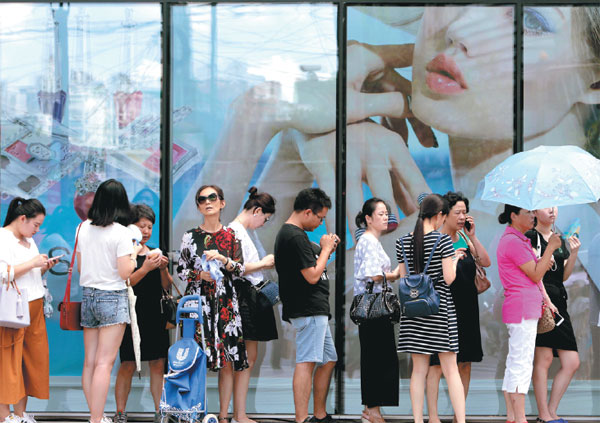Duty free shop competes for consumers
Consumers flocked to a duty free shop which opened in downtown Shanghai on Monday, although its prices were higher than airport duty free shops.
The shop, operated by China National Service Corporation, is an example of the efforts that Chinese enterprises make to unlock the potential of domestic consumers at a time of record low economic growth.
Products from more than 100 brands are being sold in the 3,300-square-meter, two-floor store that sits in a commercial complex in Jing'an district, one of Shanghai's busiest commercial hubs.
|
Buyers line up outside a duty free shop which opened in downtown Shanghai on Monday. Yin Liqin / For China Daily |
Consumers started lining up waiting for the opening around 9 am, even though it did not open until after 10 am. Because more than 500 consumers were already in the store around 10:15 am, the store had to limit entry to ensure safety and the consumer experience.
Chinese consumers older than 16 years who can present documents showing they have arrived from overseas within the past 180 days are eligible to shop in the duty free shop, according to the regulations and policy of the duty free retail sector.
According to data from the Ministry of Commerce, the total size of Chinese residents' consumption abroad last year was about 1.2 trillion yuan ($180.16 billion).
Analysts said that many opportunities can emerge from consumption upgrading, if some of the consumption abroad is directed back to the domestic market.
"It is no exaggeration to say that consumption is one of the pillars of economic growth in China nowadays. As Chinese residents are better traveled than ever, they are exposed to a wide range of products and they wish to buy immediately once they run out. Retailers that can offer them products such as food and other goods at competitive prices are more likely to gain from this emerging opportunity," said Zhang Yuanfan, an analyst with Shanghai-based Yu Song Commerce Consultancy Ltd.
Total retail sales of consumer goods in 2015 exceeded 30 trillion yuan, 14.3 percent year-on-year growth, according to data from the Ministry of Commerce.
According to a research note from Founder Securities Co Ltd, consumption-related companies including food and beverage firms were among the best-performing ones in the first half of 2016, and the growth is expected to be long-term, instead of a one-off.
Ma Nan, a 32-year-old mother of two children, said the prices of goods sold in the CNSC duty free shop were lower than those in regular retail channels and the shop saved her the trouble of asking friends the favor of shopping for her goods when they are overseas.
"The 69 yuan Belgian chocolate is about 30 percent cheaper than that in the company's own brand name chain store. The Japanese skincare lotion is 380 yuan, 20 percent lower than that on Tmall.com, an e-commerce platform of Alibaba Group Holding Ltd. The best thing is that when I want to have them, I buy them immediately," said Ma.
Yan Jianxin, deputy manager with the CNSC duty free products segment, said that the store in downtown Shanghai has been trying to differentiate itself from other duty free shops by offering a wide range of products that help meet consumers' day-to-day demands.
The CNSC store is more like a supermarket of imported goods with 10,000 products from 100 categories, said Yan.
Besides the traditional items that consumers may find at airport duty free shops such as perfume, cosmetics, leather goods, luxury accessories and liquor, the store also offers baby food, electronic home appliances and toys, which are rarely seen in duty free shops at airports.
"If a consumer wants to buy an imported electronic home appliance but hates to bring the heavy package from another country, shopping for it here can be an option," said Yan.
wuyiyao@chinadaily.com.cn



















